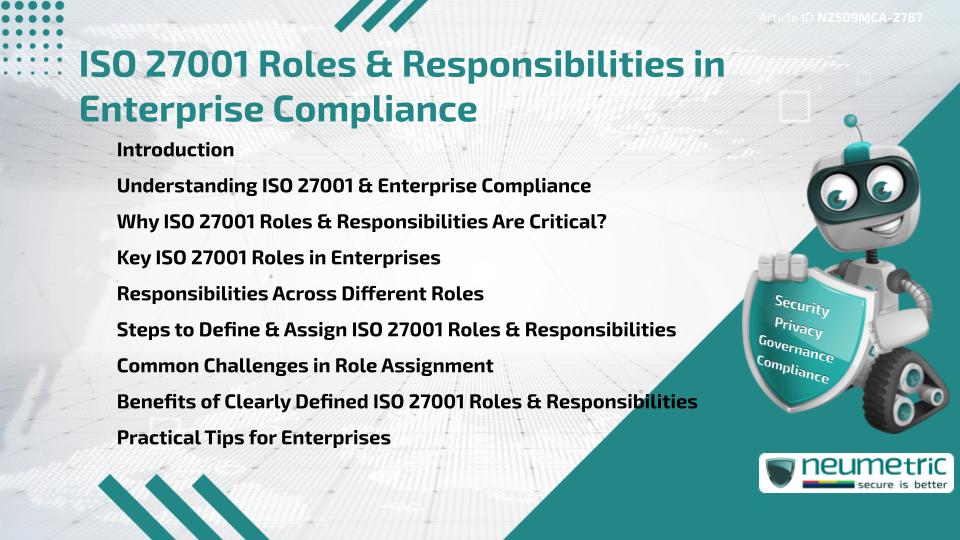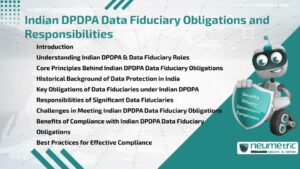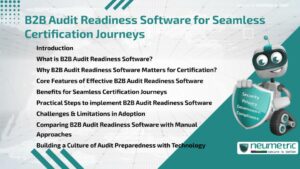Table of Contents
ToggleIntroduction
ISO 27001 roles & responsibilities form the backbone of enterprise compliance by ensuring that Information Security is managed effectively across all levels. This Framework assigns accountability, defines tasks & promotes shared responsibility to safeguard critical data & systems. Without clearly defined roles, enterprises Risk confusion, inefficiency & non-compliance. This article explores the key roles under ISO 27001, their responsibilities, challenges & how enterprises can structure them to achieve compliance & resilience.
Understanding ISO 27001 & Enterprise Compliance
ISO 27001 is the international Standard for establishing, implementing & maintaining an Information Security Management System [ISMS]. It requires enterprises to assign roles & responsibilities to ensure that Policies, processes & controls are applied consistently. Compliance is not simply about meeting a checklist; it is about aligning the enterprise’s people, processes & technologies to safeguard information assets.
An easy analogy is a sports team: without players knowing their positions, even the best strategy fails. ISO 27001 roles ensure everyone knows their part in protecting the enterprise.
Why ISO 27001 Roles & Responsibilities Are Critical?
Enterprises often face Threats such as data breaches, ransomware & insider misuse. ISO 27001 roles & responsibilities ensure these Threats are managed proactively. Clearly defined tasks help avoid duplication of work, prevent oversights & demonstrate accountability during audits.
Regulators, clients & partners also expect to see a robust Governance model. When roles are unclear, enterprises Risk both security lapses & reputational damage.
Key ISO 27001 Roles in Enterprises
Typical roles in ISO 27001 enterprise compliance include:
- Top Management: Provides direction, resources & leadership commitment.
- Information Security Officer: Oversees the ISMS & ensures alignment with ISO 27001 requirements.
- ISMS Committee or Steering Group: Coordinates implementation across departments.
- Department Heads: Ensure compliance within their areas of responsibility.
- Employees: Follow Policies, report incidents & contribute to security culture.
- Internal Auditors: Conduct internal audits & recommend improvements.
Responsibilities Across Different Roles
Each role carries distinct responsibilities that must be clearly defined:
- Top Management: Approve Policies, allocate budgets, review ISMS performance.
- Information Security Officer: Develop Risk Assessments, monitor controls, lead Training Programs.
- Committee or Steering Group: Align business & security goals, oversee Incident Response.
- Department Heads: Ensure Employees follow procedures, report Risks.
- Employees: Protect passwords, adhere to acceptable use Policies, report suspicious activity.
- Internal Auditors: Verify compliance, highlight Non-Conformities & recommend Corrective Actions.
Steps to Define & Assign ISO 27001 Roles & Responsibilities
Enterprises can structure their compliance program with the following steps:
- Identify Key Stakeholders: Map who is affected by the ISMS.
- Define Responsibilities: Clearly document tasks & accountabilities.
- Communicate Roles: Ensure every individual understands their duties.
- Provide Training: Equip staff with knowledge to perform their responsibilities.
- Monitor & Review: Regularly assess performance & update role assignments as needed.
This structured approach ensures responsibilities are not only defined but also executed consistently.
Common Challenges in Role Assignment
Enterprises often face challenges such as:
- Lack of Top Management engagement.
- Overlapping responsibilities leading to confusion.
- Limited staff expertise in Information Security.
- Resistance to adopting new responsibilities.
Overcoming these requires strong leadership, regular communication & continuous education.
Benefits of Clearly Defined ISO 27001 Roles & Responsibilities
When enterprises assign & enforce roles effectively, they gain:
- Stronger accountability & reduced Risk of errors.
- Improved Audit performance & faster Certification readiness.
- Better integration of security practices into daily operations.
- Enhanced trust from clients, regulators & partners.
- A proactive security culture across the Organisation.
Practical Tips for Enterprises
To strengthen ISO 27001 roles & responsibilities:
- Draft a responsibility matrix that links roles to specific tasks.
- Involve Top Management to set a tone of accountability.
- Encourage cross-department collaboration.
- Keep documentation simple & accessible.
- Review roles periodically to adapt to organizational changes.
Takeaways
- ISO 27001 roles & responsibilities provide structure for enterprise compliance.
- Key roles include Top Management, Information Security officers, auditors & Employees.
- Clearly defined responsibilities reduce Risks & improve Audit outcomes.
- Common challenges can be overcome with leadership support & training.
- Strong role assignment fosters accountability & a resilient security culture.
FAQ
What are ISO 27001 roles & responsibilities?
They are defined tasks & accountabilities assigned to individuals & teams to ensure compliance with ISO 27001.
Why are ISO 27001 roles & responsibilities important?
They prevent confusion, reduce Risks & ensure accountability in managing Information Security.
Who is responsible for ISO 27001 compliance in an enterprise?
Top Management is ultimately responsible, but every Employee plays a role in compliance.
What is the role of an Information Security Officer?
The officer oversees the ISMS, manages Risk Assessments & ensures compliance with ISO 27001.
How do internal Auditors contribute to ISO 27001 compliance?
They conduct audits, identify gaps & recommend Corrective Actions.
How can enterprises assign roles effectively?
By defining responsibilities, providing training & maintaining clear communication across departments.
What challenges arise in role assignment under ISO 27001?
Challenges include lack of leadership support, overlapping duties & limited expertise.
Need help for Security, Privacy, Governance & VAPT?
Neumetric provides organisations the necessary help to achieve their Cybersecurity, Compliance, Governance, Privacy, Certifications & Pentesting needs.
Organisations & Businesses, specifically those which provide SaaS & AI Solutions in the Fintech, BFSI & other regulated sectors, usually need a Cybersecurity Partner for meeting & maintaining the ongoing Security & Privacy needs & requirements of their Enterprise Clients & Privacy conscious Customers.
SOC 2, ISO 27001, ISO 42001, NIST, HIPAA, HECVAT, EU GDPR are some of the Frameworks that are served by Fusion – a SaaS, multimodular, multitenant, centralised, automated, Cybersecurity & Compliance Management system.
Neumetric also provides Expert Services for technical security which covers VAPT for Web Applications, APIs, iOS & Android Mobile Apps, Security Testing for AWS & other Cloud Environments & Cloud Infrastructure & other similar scopes.
Reach out to us by Email or filling out the Contact Form…





